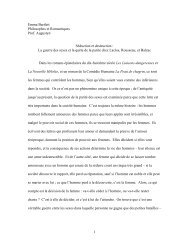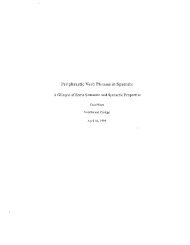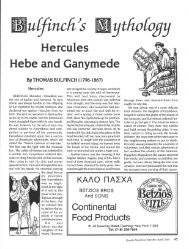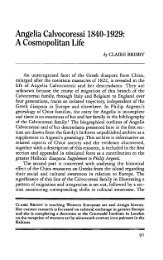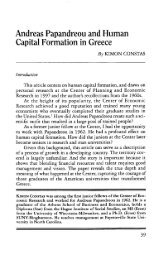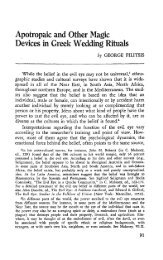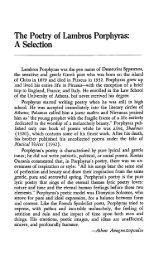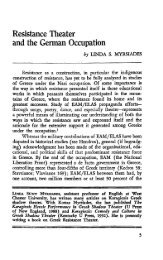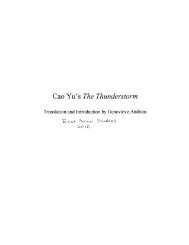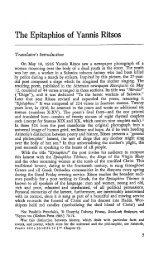Translating Neruda: Femininity and Sensuality ... - Triceratops Home
Translating Neruda: Femininity and Sensuality ... - Triceratops Home
Translating Neruda: Femininity and Sensuality ... - Triceratops Home
Create successful ePaper yourself
Turn your PDF publications into a flip-book with our unique Google optimized e-Paper software.
Mueller 30<br />
we see how clarification according to English grammatical rules can result in a loss of or<br />
change in meaning from the source text. In addition to this loss of ambiguity, however, is<br />
the loss of <strong>Neruda</strong>’s specific vocabulary choice that works to enhance the sense of<br />
femininity in Spanish. He uses the word “vientre,” which has two possible translations.<br />
While “belly,” used by all four translators, is an accurate literal translation, this choice<br />
neglects the potential extension of the feminine identity of the onion with the alternate<br />
meaning, “womb.” This second meaning also fits with the birth narrative in the<br />
beginning of the poem, supporting <strong>Neruda</strong>’s description of the “milagro” of the onion’s<br />
development <strong>and</strong> the birth of the onion’s leaves.<br />
The connotation of certain words, both in Spanish <strong>and</strong> in English, serves to either<br />
build or lessen the femininity of the poem. <strong>Neruda</strong>’s sexualized description of the<br />
cooking process—“deshaces / tu globo de frescura / en la consumación / ferviente de la<br />
olla”— is a good example of this. Mitchell’s translation maintains the visceral, physical<br />
action of <strong>Neruda</strong>’s phrase, with “you undo / your globe of freshness / in the fervent<br />
consummation / of the cooking pot.” Jacketti maintains the concept of cooking as union<br />
with “you break / your fresh globe / in sizzling marriage / with the stew pot,” but<br />
“sizzling marriage” lacks the explicit sexuality of the original <strong>and</strong> refocuses the reader on<br />
the culinary aspect of the image with its stovetop connotation. Krabbenhoft directly<br />
translates “consumación” as “consummation,” like Mitchell, but again relates it more<br />
closely to the culinary realm by choosing “boiling” for “ferviente.” Additionally, his<br />
translation of “globo” as “balloon” destroys the sensuality of the phrase by using an<br />
overly specific <strong>and</strong> illogical translation of the word that does not fit with the context of<br />
the poem. Finally, Lozano gives us “you undo your bulb of freshness / in the hot



